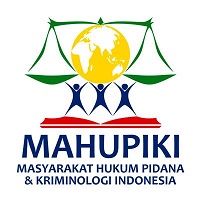PERAN PAMONG ATAU WALI NAPITER DALAM PROSES DERADIKALISASI NARAPIDANA TERORISME PEREMPUAN DI LEMBAGA PEMASYARAKATAN (STUDI KASUS LEMBAGA PEMASYARAKATAN PEREMPUAN KELAS IIA JAKARTA PERIODE TAHUN 2023 - 2024)
Keywords:
Deradicalization, Napiter, Sheriff of Napiter, PrisonAbstract
As time goes by, the number of female prisoners in Indonesia is increasing, this increase is caused by various factors, one of which is the implementation of Law of the Republic of Indonesia Number 5 of 2018 concerning Amendments to Law Number 15 of 2003 concerning the Establishment of Government Regulations in Lieu of Laws. Law Number 1 of 2002 concerning the Eradication of Criminal Acts of Terrorism Becomes Law. This research is an effort to find out the role of prison guardians as correctional guardians in the Jakarta Class IIA Women's Prison and what things can become obstacles for prison guardians in the deradicalization process. It is hoped that this deradicalization program can reduce the rate of repetition of criminal acts. This research was conducted using qualitative data analysis methods, with normative juridical research supported by empirical juridical research in the form of direct interviews with guardians of terrorism convicts in the Jakarta Women's Prison. The results of this research indicate that the role of the pamong or guardian of prisoners in the Jakarta Class IIA Women's Prison in the process of deradicalization of female prisoners is in accordance with the Regulation of the Minister of Law and Human Rights of the Republic of Indonesia Number: M. 01 PK.04.10. 2007 Regarding Correctional Guardians, as well as in implementing the deradicalization program, correctional guardians experienced several obstacles such as the resistant attitude of prisoners, overcrowded prison conditions, inadequate expert staff, and applicable regulations. So it is necessary to create a special residential block for prisoners, provide adequate human resources to support the deradicalization program and change more specific regulations to the regulations regarding guardians of prisoners.
References
Abdul Wahid. Kejahatan Terorisme Perspektif Agama, HAM, dan Hukum. Bandung: Rafika Aditama, 2004.
John Philip Jenkins. “Definitions of Terrorism,” diakses 10 April 2024.
MD. Shodiq. Paradigma Deradikalisasi dalam Perspektif Hukum. Jakarta: Pustaka Harakatuna, 2018.
Muhammad Hasan Ansori et al. Memberantas Terorisme di Indonesia: Praktik, Kebijakan, dan Tantangan. Jakarta: The Habibie Center, 2019.
Rikard Bagun. “Indonesia di Peta Terorisme Global,” diakses 10 April 2024.
Warapsari Jihadtullah T. Skripsi: Analisis Keterlibatan Perempuan dalam Kontra Terorisme di Indonesia oleh BNPT Melalui Pendekatan Feminisme Kultural (2015-2019). Yogyakarta: UII, 2021.
Wawancara langsung dengan wali narapidana terorisme Devita Nur Anggraini, S. Psi, pada Selasa, 23 Juli 2024, di Lembaga Pemasyarakatan Perempuan Kelas IIA Jakarta, pukul 10.00 WIB.
Undang-Undang Dasar Negara Republik Indonesia Tahun 1945
Undang-Undang Nomor 22 Tahun 2022 Tentang Pemasyarakatan
Undang-Undang Nomor 5 Tahun 2018 Tentang Perubahan Atas Undang-Undang Nomor 15 Tahun 2003 Tentang Penetapan Peraturan Pemerintah Pengganti Undang-Undang Nomor 1 Tahun 2002 Tentang Pemberantasan Tindak Pidana Terorisme Menjadi Undang-Undang
Permenkumham RI Nomor: M.01 PK.04.10. Tahun 2007 Tentang Wali Pemasyarakatan;
Peraturan Badan Nasional Penanggulangan Terorisme Nomor 1 Tahun 2021 Tentang Koordinasi Pelaksanaan Deradikalisasi Bagi Tersangka, Terdakwa, Terpidana, Dan Narapidana Tindak Pidana Terorisme
Peraturan Pemerintah Republik Indonesia Nomor 77 Tahun 2019 Tentang Pencegahan Tindak Pidana Terorisme Dan Pelindungan Terhadap Penyidik, Penuntut Umum, Hakim, Dan Petugas Pemasyarakatan
Peraturan Menteri Hukum dan Hak Asasi Manusia Republik Indonesia Nomor 35 Tahun 2018 Tentang Revitalisasi Penyelenggaraan Pemasyarakatan
Peraturan Menteri Hukum Dan Hak Asasi Manusia Republik Indonesia Nomor M.HH-16.KP.05.02 Tahun 2011 Tentang Kode Etik Pegawai Pemasyarakatan;
Peraturan Menteri Hukum Dan Hak Asasi Manusia Republik Indonesia Nomor M.HH-05.0T.01.01 Tahun 2011 Tentang Perubahan Atas Keputusan Menteri Kehakiman Nomor M.01-PR.07.03 Tahun 1985 Tentang Organisasi Dan Tata Kerja Lembaga Pemasyarakatan
Keputusan Menteri Kehakiman Republik Indonesia Nomor: M.01.PR.07.03 Tahun 1985 Tentang Organisasi dan Tata Kerja Lembaga Pemasyarakatan.
Surat Edaran Nomor PAS-09.OT.02.02 Tahun 2023 Tentang Pernyataan Ikrar Setia Narapidana Tindak Pidana Terorisme Kepada Negara Kesatuan Republik Indonesia.
Downloads
Published
How to Cite
Issue
Section
License
Copyright (c) 2025 Royyani Habibah, Indah Sari

This work is licensed under a Creative Commons Attribution 4.0 International License.









